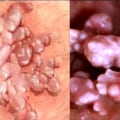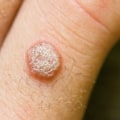Genital warts are a common sexually transmitted infection (STI) that can cause soft, fleshy bumps to appear on the skin and mucous membranes of the genitals. These warts can be found on the penis, vulva, urethra, vagina, cervix, and around and inside the anus. They may appear as single warts or in clusters, and can range in size from small to large. Genital warts are spread through sexual contact and can look like whitish or skin-colored bumps. Limiting the number of sexual partners and getting vaccinated are two ways to help prevent the spread of genital warts.
However, not everyone with HPV develops genital warts, and even those with a history of wart outbreaks may never have another outbreak. Genital warts can also develop in the mouth or throat of a person who has had oral sexual contact with an infected person. If you have warts or red bumps on or around your genitals, if your partner has HPV or another STI, or your partner has genital warts, it is important to see your doctor or nurse or contact your local Planned Parenthood health center. People with genital warts should assume that they are contagious and discuss risk and risk mitigation strategies with their partners. Using a condom every time you have sex is a good idea, but it won't necessarily protect you from genital warts. The strain of HPV that causes genital warts is spread through skin-to-skin contact with someone who has it, often during vaginal, anal, or oral sex.
Symptoms of genital warts caused by HPV in men include small bumps or groups of bumps on the tip or shaft of the penis, scrotum, or anus. It can take several weeks, months, or even years after having sexual contact with someone who has genital warts for them to appear. Genital warts don't cause sores, bleeding, or open wounds unless the person scratches them or they get caught on something. The doctor may recommend having a regular Pap smear or other tests depending on the person's history of genital warts. For this reason, the fact that a person has not had sexual contact recently does not exclude the possibility of having genital warts.
Preventing Genital Warts
The best way to prevent genital warts is to practice safe sex by using condoms every time you have sex.This will reduce your risk of contracting HPV and other STIs. Additionally, getting vaccinated against HPV can help protect you from developing genital warts. It is also important to limit your number of sexual partners and get tested regularly for STIs if you are sexually active. If you think you may have been exposed to HPV or have any symptoms of genital warts, it is important to see your doctor right away.
Treating Genital Warts
Genital warts can be treated with topical medications such as creams and ointments. These medications work by killing the virus that causes the wart.In some cases, surgery may be necessary to remove larger warts. It is important to note that even after treatment for genital warts, there is still a chance that they may come back. This is because the virus that causes them can remain in the body even after treatment. Therefore, it is important to practice safe sex and get tested regularly for STIs if you are sexually active.
Conclusion
Genital warts are a common STI that can cause soft, fleshy bumps to appear on the skin and mucous membranes of the genitals. Limiting the number of sexual partners and getting vaccinated are two ways to help prevent the spread of genital warts.If you think you may have been exposed to HPV or have any symptoms of genital warts, it is important to see your doctor right away. The best way to prevent genital warts is to practice safe sex by using condoms every time you have sex and getting vaccinated against HPV. Additionally, it is important to limit your number of sexual partners and get tested regularly for STIs if you are sexually active.










